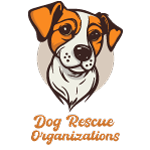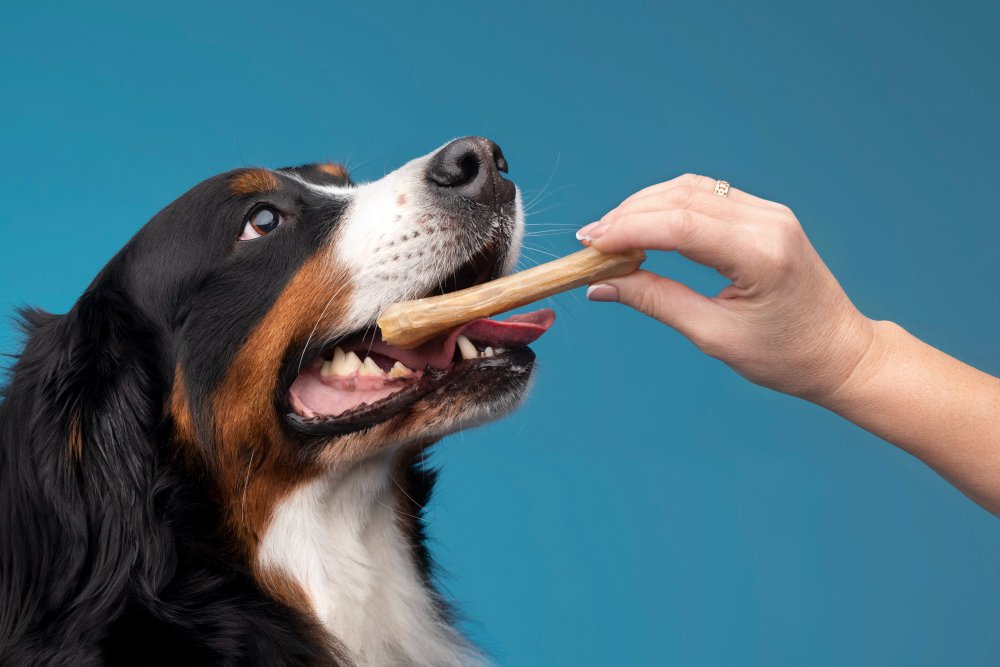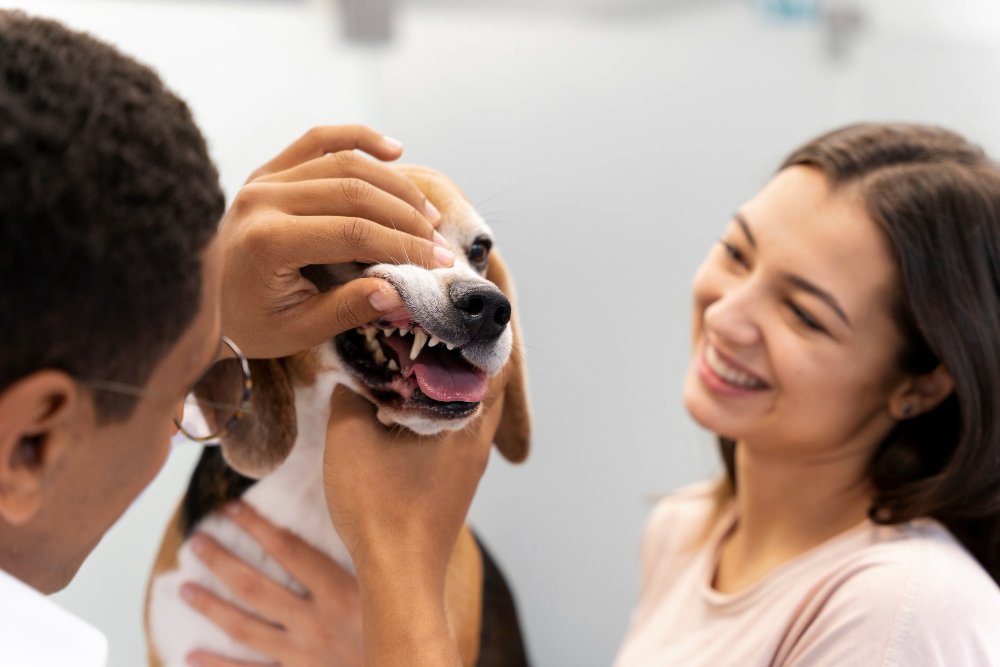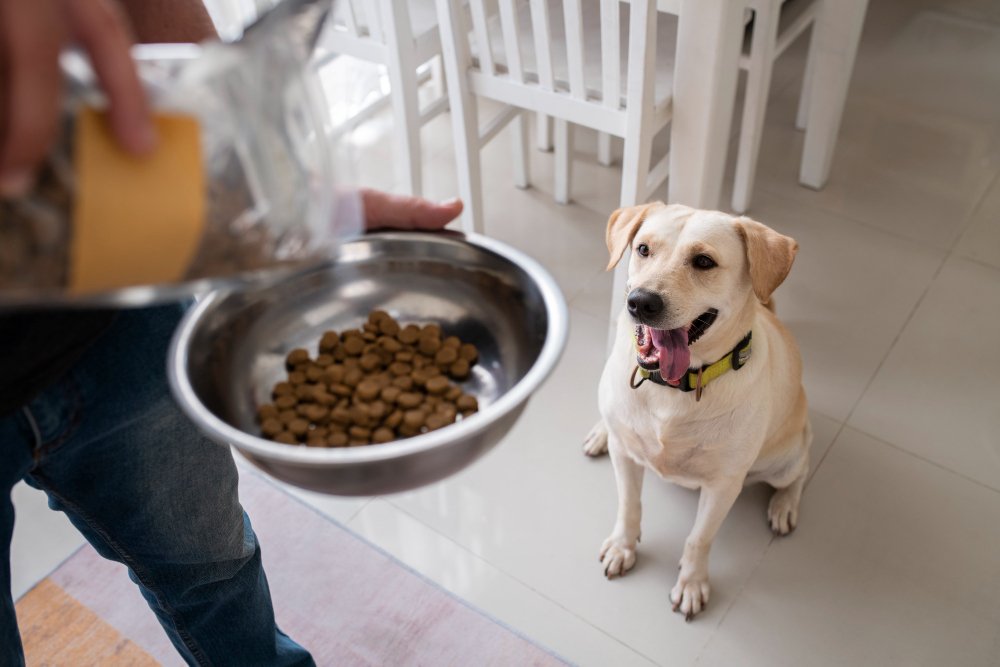Introduction to Cleaning Your Dog’s Teeth
Why dog dental health is important
Your dog’s general health depends on how well his teeth are taken care of. Bad oral care can cause a number of health problems such as gum disease illnesses and even problems with the heart and kidneys that affect the whole body. Cleaning your dog’s teeth not only keeps their mouth healthy but it also makes them live longer and better.
Table of Contents
ToggleA Look at Natural Ways to Clean
A lot of pet owners are looking for natural options to the commercial tooth care items they usually use. You can clean your dog’s teeth with natural methods that work just as well and often come with the extra benefit of not using harsh chemicals. This article will talk about a number of natural ways to keep your dog’s teeth healthy such as mechanical methods, food changes, and plant treatments.
Types and Categories of Natural Teeth Cleaning Methods
Methods of Cleaning with Machines
Mechanical cleaning involves physical actions that help clear plaque and tartar from your dog’s teeth This includes cleaning, chewing on dental toys and using dental chews meant to scrape away buildup.
Dietary Cleaning Methods
What your dog eats can greatly impact their teeth health. Certain foods and treats are meant to help clean teeth as your dog chews while a raw food diet can naturally reduce plaque and tartar.
Herbal and Home Remedies
Herbal and home treatments include natural substances like coconut oil apple cider vinegar and specific herbs and essential oils known for their antibiotic qualities and ability to support mouth health.
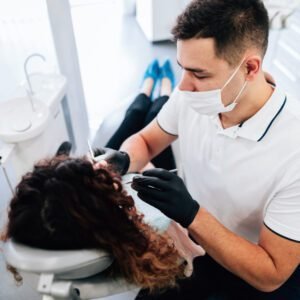
Symptoms and Signs of Dental Problems in Dogs
Bad Breath
Bad breath or halitosis is one of the earliest and most common signs of teeth problems in dogs. It is often caused by the buildup of bacteria and plaque on the teeth and gums.
Inflamed Gums
Gingivitis or swollen gums is another sign of poor tooth health. Red swollen or bleeding gums suggest that your dog may be getting periodontal disease.
Tartar Buildup
Tartar, a solid form of plaque, can build on your dog’s teeth if not regularly cleared. It often shows as a yellow or brown layer on the teeth, especially near the gum line.
Drooling and Pawing at the Mouth
Excessive dripping and pawing at the mouth can signal oral soreness or pain. These actions may signal that your dog has a tooth problem that requires attention.
Causes and Risk Factors of Dental Problems in Dogs
Poor Diet
A diet high in sugars and carbs can add to the growth of plaque and tartar. Feeding your dog a healthy meal with natural, wholesome items can help avoid teeth problems.
Lack of Chewing
Dogs need to chew to keep their teeth clean. Without proper biting, plaque can build and turn into tartar. Providing proper chew toys and treats can encourage this normal habit.
Genetic Factors
Some breeds are more prone to teeth problems due to natural causes. Smaller breeds, in particular often have crowded teeth, making them more sensitive to plaque and tartar buildup.
Age-related Changes
As dogs age they may be more prone to teeth problems. Regular dental care becomes increasingly important to handle these age-related changes and keep mouth healthy

Diagnosis and Tests for Canine Dental Health
Veterinary Dental Examinations
Regular dental check-ups with your doctor are important for tracking your dog’s mouth health. Vets can spot early signs of oral disease and suggest suitable solutions.
Dental X-Rays
Dental X-rays can provide a thorough view of your dog’s teeth and jaws helping to identify problems that are not noticeable during a normal checkup.
At-Home Dental Checks
Conducting regular at-home checks can help you spot possible tooth problems early. Look for signs of plaque tartar swollen gums and any changes in your dog’s eating or chewing habits.
Methods of Cleaning with Machines
Brushing Your Dog’s Teeth
Brushing your dog’s teeth is one of the most effective ways to clear plaque and avoid tartar buildup. Use a dog-specific toothbrush and toothpaste and gently introduce the practice to your pet.
Using Dental Chews
Dental chews are made to help clean your dog’s teeth as they chew. These chews can reduce plaque and tartar and are often filled with chemicals that support tooth health.
Toys for Dental Health
Dental tools, such as rubber or nylon bones and carefully made chew toys can help keep your dog’s mouth health. These toys are often rough to help scrub away plaque as your dog plays with them.
Dietary Cleaning Methods
Raw Food Diet
A raw food diet can easily help keep your dog’s teeth clean. Raw meat and bones provide natural friction that helps reduce plaque and tartar
Dental Treats and Kibbles
Some commercial dog foods and treats are especially designed to support tooth health. These items often have a unique feel that helps clean teeth as your dog eats.
Natural Foods that Promote Dental Health
Incorporating certain natural foods into your dog’s diet can support mouth health. For example carrots and apples can help clean teeth and improve breath.
Herbal and Home Remedies
Coconut Oil
Coconut oil has natural antibiotic properties that can help your dog’s mouth health. You can apply a small amount to your dog’s teeth and gums or add it to their food.
Apple Cider Vinegar
Apple cider vinegar can help keep oral health by balancing the pH levels in your dog’s mouth. Dilute it with water and use it as a mouth rinse or add a small amount to your dog’s water bowl.
Herbs and Essential Oils
Certain herbs and essential oils, such as parsley, peppermint, and clove oil, can promote fresh breath and reduce bacteria in the mouth. Use them in moderation and ask your doctor before use.
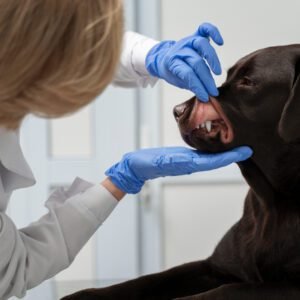
Preventive Measures
Regular Veterinary Check-ups
Regular dental check-ups with your vet are important for keeping your dog’s mouth health. Your doctor can provide skilled cleanings and watch for any signs of oral disease.
Balanced Diet
Feeding your dog a healthy meal rich in nutrients can help avoid teeth problems. Avoiding foods high in sugars and carbohydrates is particularly important for keeping mouth health.
Consistent Dental Care Routine
Establishing a constant dental care practice that includes brushing, dental chews, and regular check-ups can significantly reduce the risk of teeth problems in your dog.
Personal Stories or Case Studies
Case Study: Improved Dental Health with Natural Methods
Share a full case study of a dog whose tooth health improved greatly through the use of natural methods, showing the specific strategies used and the results achieved.
Pet Owner Testimonials
Include comments from pet owners who have successfully used natural ways to keep their dogs’ teeth health. These stories can provide useful lessons and support to other cat parents.
Expert Insights Veterinarian Advice on Natural Teeth Cleaning
Include quotes and tips from vets who back the use of natural methods for cleaning dogs’ teeth. Their professional views can give believability to the information provided.
Holistic Pet Care Experts
Incorporate comments and suggestions from organic pet care experts who support for natural tooth care methods. Their opinions can provide a well-rounded view of the topic.
Conclusion Summary of Key Points
Summarize the main points covered in the piece, stressing the value of natural tooth care methods and their benefits for your dog’s general health.
Call to Action for Further Education
Encourage people to continue learning about natural pet care and to speak with their vets for personalized tips on keeping their dog’s teeth health.
FAQs
Ideally, you should brush your dog’s teeth daily or at least a few times a week.
While helpful, raw bones are not ideal for all dogs. Consult your vet to ensure they’re safe for your pet.
No, human toothpaste includes chemicals that can be dangerous to dogs.
Bad breath, red or swollen gums, and trouble eating are typical signs.
Mix baking soda with water or olive oil to make a dough. Add a few drops of a dog-safe essential oil for taste.
